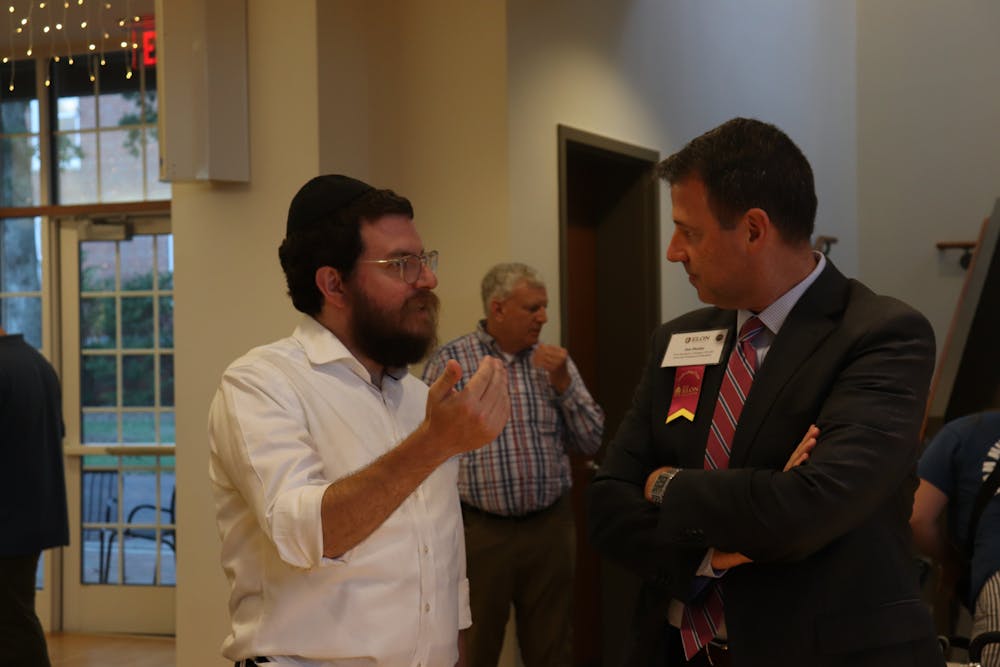Numen Lumen Pavilion — a multifaith sacred space in the heart of Elon University — is celebrating its 10th anniversary.
Numen Lumen was established in 2013 and houses the Truitt Center for Religious and Spiritual Life and the Center for the Study of Religion, Culture and Society.
According to the Truitt Center’s website, the center fosters a space for discussion of religion within the campus community, explores shared aspects of common humanity and promotes the values of multifaith collaboration.
Since 2021, the Rev. Kirsten Boswell has served as university chaplain and dean of multifaith engagement, working previously as a chaplain at MIT, Brown and Bentley University. Boswell said she praises Elon’s Numen Lumen for the community it has built.
“From working on different university campuses, it’s rare to have such a beautiful, dedicated space with dedicated staff,” Boswell said.
Boswell sheds light on the various roles of this unique space.
“People come into the space for any number of things. It could be for emotional support, spiritual support, you know, because they're struggling financially,” Boswell said. “It could be any number of things.”
In her role as a chaplain, Boswell said she is mindful that Numen Lumen serves as a source of care and support for the entire campus community.
“Whether it's helping to connect them to the resources that they need to be able to center and, find their space, find their identity, help them with meaning and purpose and figuring out, figuring out all of those things,” Boswell said.
Boswell said she has seen fewer and fewer students maintain their religious frameworks upon coming to college.
She said she sees the Truitt Center — a key part of Numen Lumen – as a place to help maintain personal faith for students.
“When you look at the Truitt Center's mission statement, one of the things that we talk about is engaging the campus with the wisdom of the world's spiritual and religious traditions,” Boswell said. “I think that's really important because even as people are trending toward less engagement, there are still those timeless truths that are found in many of the world's religious traditions that dictate how we should live in the world, how we should engage.”
Freshman Jonathan Loeb, who practices Judaism, said he has gained appreciation for Numen Lumen for this very reason.
“I really feel like it has helped to shape my identity at Elon as it has allowed me to connect with my religion and community — even though I’ve been so far away from my home, which I think is really special,” Loeb said.
He utilizes Numen Lumen in a way so he can feel connected with his Jewish community back at home.
“I wanted to be able to find a community to be able to practice my religion and go to services,” Loeb said. “Numen Lumen allowed me to have that space with people who share similar religious beliefs and be able to participate in services that made me feel as close to being at home as I could.”
Boswell said cultivating meaningful relationships is another of Numen Lumen’s central priorities.
“This is something that Elon is really known for, is helping people to foster really strong relationships during their time here,” Boswell said. “So we're focusing on the breadth and depth and depth of relationships that have come out of and grown out of this pavilion.”
Boswell spoke at the celebration Oct. 2, along with Brian Pennington, director of the CSRCS, as well as a professor of religious studies.
“One of my primary roles at Elon is to help students understand varying religious traditions of their own as well as others to promote common understanding, cultural literacy, and global citizenship,” Pennington said. “Academics is part of multi faith at Elon, and it's an avenue through which students have experienced a lot of personal growth in their capacities to navigate a complex global world”.
Pennington said he works individually with students in CSRCS’ multifaith scholars program. Students in this program dedicate their Junior and Senior year to researching a topic of their choice surrounding multifaith through global engagement, internships and other research experiences.
Pennington emphasizes that at Elon, multifaith initiatives promote growth on both intellectual and personal levels, and his colleagues make a strong effort to guide these scholars on their journey.
“The multifaith efforts at Elon are about academic inquiry and intellectual growth and learning as much as they are about personal exploration,” Pennnington said. “To pursue those objectives I work with my colleagues in, my faculty colleagues in various departments as well as Truitt Center staff to develop programming that helps to teach students and expose the wider community to the various ways that religion comes to life in our world.”
Students that Pennington has worked closely with have covered topics from all over the world.
“I have worked with students who have been exploring things like Islamophobia in the U.S. airline industry. Students who are trying to understand sort of things like church and state relationships in various countries around the world like Denmark and Egypt,” Pennington said. “This has been really rewarding for me and we've seen students have transformative experiences doing this kind of research.”


